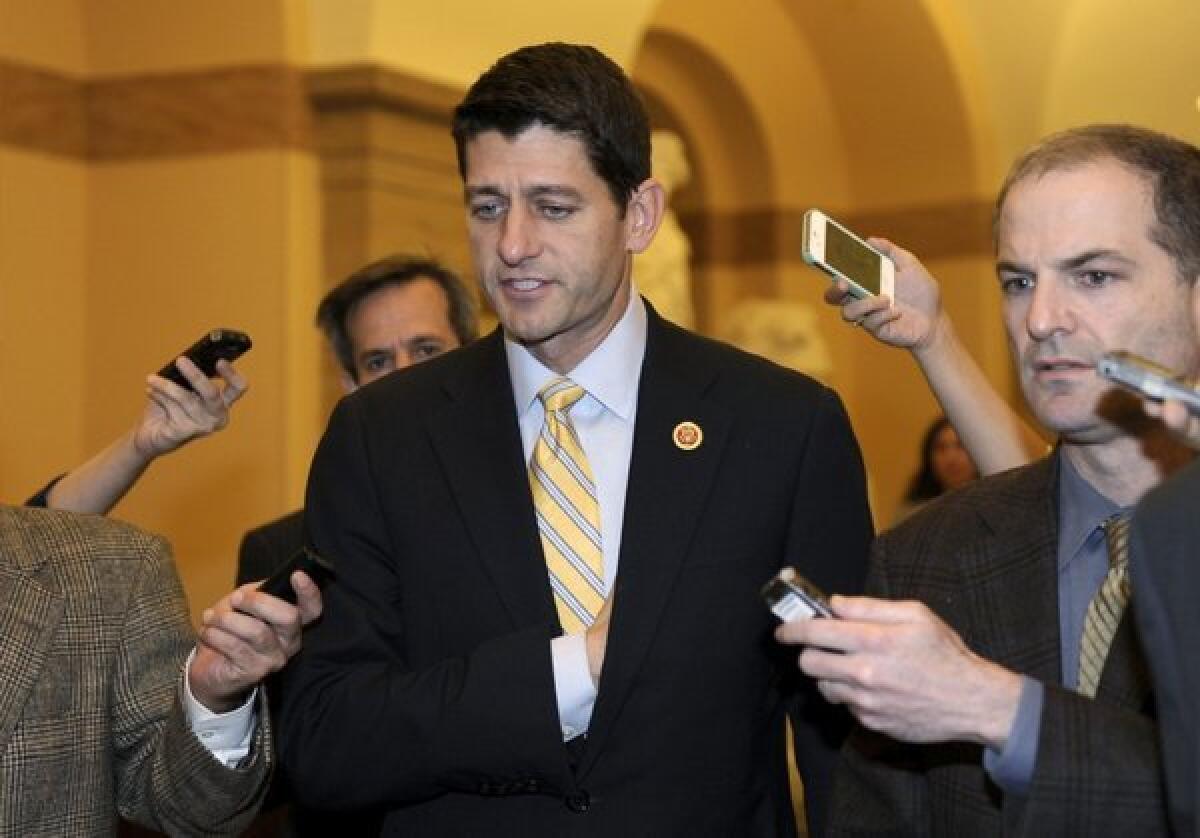The four stupidest ideas for ending the shutdown

- Share via
There are so many to choose from, but these four take the cake. In no particular order:
1. The Vitter amendment. Concocted by David Vitter (R-La.), this majestically cynical measure is based on the common misconception that members of Congress and their staffs are “exempted” from the Affordable Care Act. It would prohibit the government from paying for any part of the health insurance for federal legislators or their staff.
The facts of the “exemption” are these: During the 2010 debate over the ACA, Sen. Chuck Grassley (R-Iowa) mischievously inserted an amendment requiring that members of Congress and their staffs get their insurance from the insurance exchanges to be set up under Obamacare. They thus became the only employees of a large employer in the country required to buy their coverage from the exchanges -- in almost every other case, big employers provide worker insurance themselves.
Like other big employers, the government customarily covered about 70% to 75% of their premium costs. But there isn’t a provision in the ACA for employer contributions to exchange-provided policies, which are designed largely for individuals who don’t get coverage through their jobs. Accordingly, the federal Office of Personnel Management issued a special ruling allowing the government to continue its usual share of employee premiums.
Vitter’s amendment is directed at the soft-minded people who think there’s something unusual or untoward about this. He undoubtedly knows the truth. The measure would impose a significant pay cut on congressional staffers, especially lower-paid workers who will have trouble making up the lost employer contributions from their own pockets. What species of person screws his own employees this way? A “Vitter,” apparently.
2. The Lankford bill. The “Government Shutdown Prevention Act” introduced by Rep. James Lankford (R-Okla.) in March, this bill would keep the government open at existing spending levels if Congress failed to pass a budget by the end of the fiscal year. But it would impose a 1% spending cut after 120 days without a budget, and additional 1% cuts every 90 days thereafter.
It’s a classic poison pill, and it’s the U.S. economy that would get poisoned. It obviously does nothing to incentivize an intransigent minority in Congress to come to grips with economic or political reality, and isn’t that exactly where we are now?
In fact, it’s a formula for the slow strangulation of economic growth, which is the problem the economy faces already, thanks to the mindlessly destructive sequester. What will it take for Congress to finally realize that economic growth is the one sure remedy for shrinking the budget deficit and the federal debt, and that efforts to cut government spending in a period of low growth only makes the economy worse?
3. Ryan’s unconscionable “conscience” clause. Rep. Paul Ryan (R-Wis.), who has a mysterious reputation for economic smarts in Washington, has reportedly now floated the idea of conditioning an end to the fiscal stalemate by inserting a “conscience” clause into the Affordable Care Act. That’s a provision that would allow employers and insurers to refuse to provide birth control coverage to their workers or policyholders on religious or moral grounds. This is nothing but a sop to the religious far right, some of the same people who got us into the standoff to begin with. It’s a battle from the 19th century, and one would think we moved past that.
4. The return of starving the seniors. Another idea from the Ryan shop. This proposal would require cuts to Social Security and Medicare as a condition for raising the debt ceiling. Ryan has been shopping this idea for more than two years now, and it’s been thoroughly repudiated -- most recently by the voters in the 2012 election, when Ryan and his running mate, Mitt Romney, were solidly thumped. There’s something fundamentally immoral about trying to balance the federal budget on the backs of the neediest and most elderly members of society.
What’s worse about all these ludicrous ideas isn’t their particular stupidity, of course. It’s that they evade the point that the Republican Party has long since abandoned its rationale for the shutdown and the threat to the debt limit in the first place -- rolling back Obamacare. That’s no longer even on the table. What’s happening in Washington right now is an infantile exercise in face-saving. To have to list the four stupidest ideas for ending the shutdown just shows how hopelessly stupid the shutdown is.
More to Read
Inside the business of entertainment
The Wide Shot brings you news, analysis and insights on everything from streaming wars to production — and what it all means for the future.
You may occasionally receive promotional content from the Los Angeles Times.











